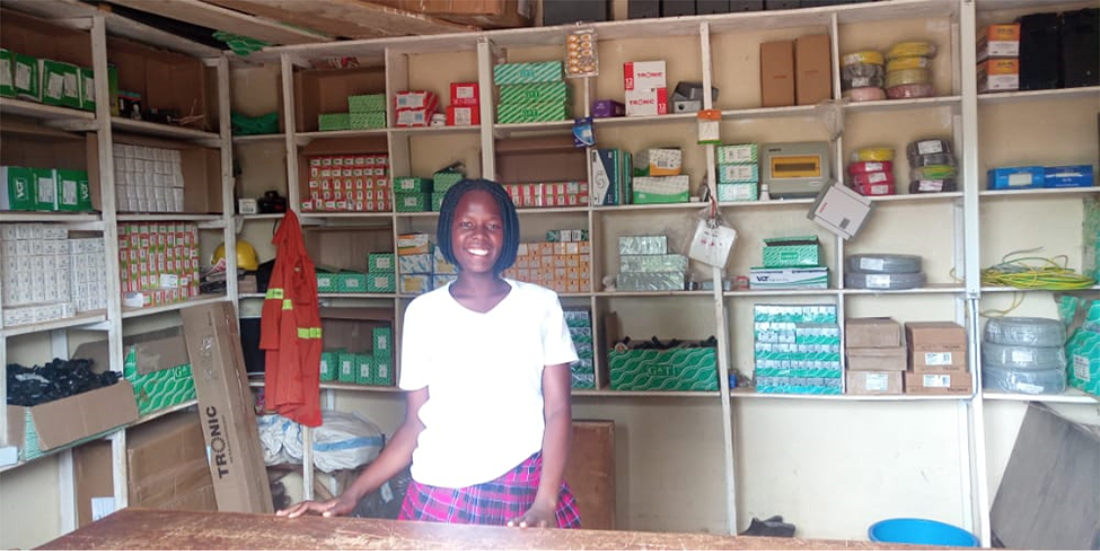Second Chance: Electrical Installation and other skills for adolescent girls and young women in Uganda
Date:

The United Nations Entity for Gender Equality and the Empowerment of Women (UN Women), with support from the Swedish government, is implementing the "Promoting Second Chance Education" Programme in Uganda for vulnerable and marginalized adolescent girls and young women.
In Uganda, UN Women is providing skills for life to teenage mothers, girls and young women living with HIV, women in sex work, people with disabilities, and survivors of sexual gender-based violence and child brides through its “Promoting Second Chance Education" Programme. The programme, supported by the Swedish Government targets vulnerable and marginalized adolescent girls and young women a six-month hands-on course in electrical installation was one of the vocations available for girls' second chance at education.
One such recipient of the program is Atemi Salami, originally from Amuria district in eastern Uganda but now residing and working in Soroti district in an Electronic Installations shop.
"In 2019, after my Senior Two, my parents were stuck and did not have enough funds to further my education," she explains.
As a result, she was forced to drop out of high school in 2019. The third child in a family of seven was upset and stressed because her future prospects had come to a halt due to a lack of funds to further her education.
"Life was difficult until UN Women came along with the Promoting Second Chance Education programme and I got a chance of joining school again," Salami says, smiling.
Salami enrolled in and completed a certificate course in Electrical Installation from Wera Technical Institute in Amuria district, before moving to Soroti where she interned and later landed a job as a salesperson in an Electrical Installations shop in Soroti city.
Salami points out that at Wera, she acquired critical skills in electrical installation, including domestic and commercial installation, which enabled her to find a job.
"I was extremely fortunate to be given this opportunity at the electronics workshop. During my internship, a district engineer recognized me and asked me to work for him. In addition to running the shop, I occasionally assist with electric installation and termination when needed," she says.
She goes on to say that thanks to the Promoting Second Chance Education programme, she didn't have to return to the village where there was no work and has been able to earn a living.
"I now support my family with basic groceries like soap and sugar, which my parents couldn't afford," says Salami.
According to Elizabeth Mushabe, Leaving No One Behind Program Specialist, UN Women Uganda, implementing the Promoting Second Chance Education programme, the effects of COVID-19 on many financially disadvantaged families were adverse affecting all members in unequal proportions.
She further mentions that most families opted to tradeoff their girl children in exchange for food, many women were trapped with violent partners while others separated due to harassment by partners and the extended family, and many girls could not return to school because they were pregnant and or nursing babies.
"With the help of the Swedish Government, UN Women, working with the Forum for African Women Educationalists – Uganda identified and supported a total of more than 1,200 young women to return to and complete various vocations, while close to 100 learners were supported to complete their UCE and UACE certification courses,” Elizabeth articulates.
She further highlights the common vocations, which include plumbing, carpentry, electrical and solar installations, motor vehicle and auto engine mechanics, catering, auto mobile repairs, tailoring, agriculture and extension services, driving, metal welding and fabrication, building and concrete practice.
Until 2021, the project was implemented in 14 districts selected from Karamoja, Acholi, Bukedi, Teso, and Ruwenzori sub regions of Uganda. These include Napak, Nakapiripirit, Kaabong, Abim, Kotido, Moroto, Gulu, Amudat, Pader, Amuria, Kitgum, Kaberamaido, Tororo and Kasese based on prevalence of HIV, teenage pregnancy and GBV among the beneficiary populations.
In 2022, the project was further extended to eight other districts of the Rwenzori region including Bunyangabu, Kyenjojo, Kyegegwa, Kamwenge, Ntoroko, Kabarole, Fortportal city and Kitagwenda.
Despite her achievements, Salami believes she has more potential.
“My dream is to acquire more knowledge in electrical engineering so that I can find the bigger opportunities because they are very many," she says.